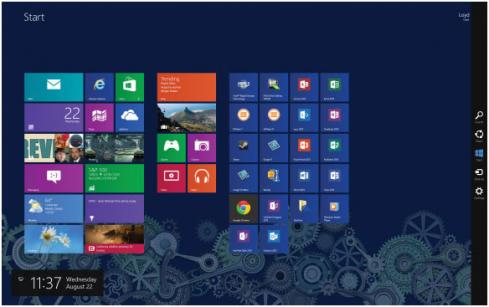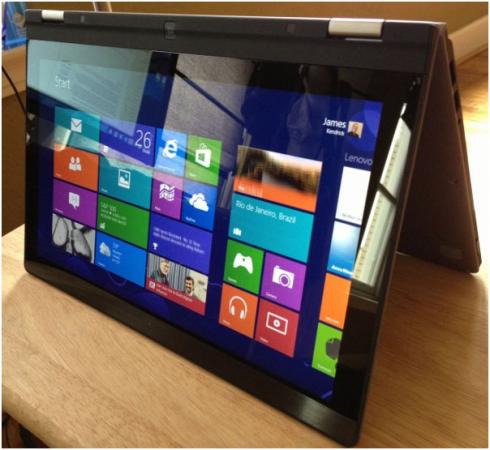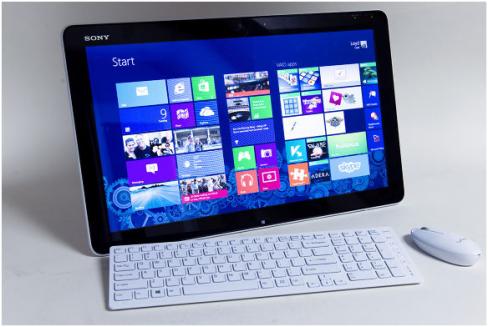Big Blast-Off for Microsoft Windows 8
Companies / Microsoft Nov 16, 2012 - 03:23 AM GMTBy: Doug_Horning
 Recent days have seen a blizzard of Microsoft-related activity, as a host of new products has blanketed the marketplace.
Recent days have seen a blizzard of Microsoft-related activity, as a host of new products has blanketed the marketplace.
First and foremost: the release of Windows 8, the most radical change in MS's flagship operating system in 17 years. The Redmond behemoth wants you to switch over, and fast. If you don't want to swap your old computer for one with the new OS pre-installed, the company has put an attractive $39.99 price out there for an in-place, downloadable upgrade (or $69.99 if you want a disc mailed).
The big news is, of course, that Windows 8 was designed to be compatible across all devices, from laptops and desktops to tablets to phones. It's touchscreen ready. It fits neatly into the new trend to junk single-platform OSes and to replace them with computing "ecosystems" (Microsoft used officers from its aptly named Planning and PC Ecosystem Team to introduce the company's new Surface tablet), and is designed to cater to the modern consumer's desire for an interconnected series of machines that mostly run tightly packaged "apps" in the sandbox style that Apple has made so famous on its iFamily of devices.
If you're the experimental type and want to upgrade your present desktop or laptop from XP or Win 7, there is some prep work to do beforehand. The folks at Cnet have prepared a quick and easy guide to help out. Be aware that Windows 8 will keep most of your settings, personal files, and programs if you upgrade from Windows 7, but Vista and XP upgraders will have to reinstall programs and reconfigure settings from scratch.
Should you choose the download option, the first thing you'll get will be a small preinstaller program that will run a quick compatibility check on your computer. It'll tell you which of your programs will and will not work under Win 8, and let you know if you have to uninstall any of them. The preinstaller will walk you through the whole process. After letting you know what details will require your attention, it asks Windows 7 upgraders what they'd like to keep of their settings, apps, and personal files. Some software conflicts can be resolved without the need to uninstall.
After that, you're ready to do the actual installation, which is a fairly painless process.
Still, most users will never upgrade their own devices. They’ll simply visit the local Costco or Best Buy and pick up a new one – and when they do, they might be in for a bit of a surprise.
Microsoft is making a rather sizeable bet that the number of people who want an OS with cross-platform convenience will vastly outnumber those who have no use for any of the new features that come with it, and who will probably be annoyed that the kind of display they've become accustomed to is gone.
Notably, PCs with the new OS installed will boot into the new Windows 8 touch-friendly "tiled" interface, which replaces the familiar Start menu and desktop; the OS offers no built-in way to set it to boot to the traditional Windows desktop.
Win 8 Start page
The screen is not a complete substitute for the old-fashioned desktop, which can still be accessed when running all those older programs still needed to get your work done. But the jarring switch back and forth between the tile-based interface with its new, "modern" design apps and the old desktop and taskbar, which confusingly only shows old-style applications running (there is a second task bar on the left side of the screen if you make the correct magic incantation with your finger or your mouse to show only new apps; but trusty old "Alt-Tab" combines them… sigh) may just be too much for some users to bear.
Not only has the startup experience changed a lot, there's much more you'll need to know in order to get familiar with Win 8 – and that's way beyond our purpose here. If you're looking for a pretty readable, in-depth look at the nuances of the new OS, however, PCWorld has prepared a nice primer.
Our point is that the Win 8 launch has in turn launched a whole new product chain. Whichever direction Microsoft moves in, that's the way that manufacturers which depend on Windows have always gone.
Of course, if you're Microsoft, you could also bring your own, self-made devices to market. And that's what the company has done with the simultaneous release of its new tablet, the Surface ($499), which might best be described as a tablet/laptop hybrid, with an attachable keyboard (+$100) to complement its touchscreen.
The Surface will come with a stripped-down version of Win 8, called RT. (An MS tablet with more powerful Intel chips and full Win 8 installed will supposedly come in the future at a higher price, but that's still in "rumor" territory.) Although such tablets will include the traditional desktop, you will have access to it only on a limited basis, to run preinstalled applications such as Office. You will not be able to install desktop programs; instead, RT tablets will focus on the Windows 8 apps you buy through Microsoft's Store.
And here is the crux of what MS is up to. Taking a cue from the Apple playbook – that company enjoys a 30% profit margin on all those apps that sell in its marketplace – Microsoft is willing to sell the new OS for cheap when it's landing in the hands of consumers, in the expectation that it will make much more on selling apps through its store than it loses by lowering the cost of entry. Higher-margin products and services, that's the name of the game – and right now it's all about the apps.
Naturally, the price of the OS doesn't matter to folks who buy a device with Win 8 preinstalled, only to those who upgrade their machines from XP or 7 to 8. And frankly, those people are not going to move the needle much. Businesses and individuals who stick with their desktops and laptops will have scant need for most of what Win 8 offers. But MS sees app-happy mobile users as the future, and that's whom they are taking dead aim at, dragging their loyal, longtime business customers behind them, kicking and screaming a little in the process. For the desktop and laptop crowd in need of an Excel fix, the company is happy to hand them a copy at full price, as everything is backward compatible, of course.
Not everyone is convinced by this business model. Many of Microsoft's OEM partners are already disgruntled about Redmond's invasion of their space with its Surface and the upcoming Windows smartphone. Acer, for one, has publicly stated that it is holding off on producing any Windows RT products until it sees how well the Surface does in the market. (It does, however, have a higher-end Win 8 tablet – see below.)
But in general, device makers – completely dependent on Redmond to give them a fighting chance against the fruity juggernaut from Cupertino – are jumping into Win 8 with both feet. Lenovo got on board with its new Yoga laptop/tablet hybrid (starting at $999), one of the biggest entrants that attempts to take advantage of Win 8's dual nature.
Lenovo Yoga
The Yoga is a full-featured laptop with a 13-inch screen that doubles as a tablet, running full Win 8, not the stripped-down RT which can't run legacy apps. It has a keyboard, a trackpad, and a touchscreen. You can set it up as a laptop, or you can flip the base completely over and use the screen tablet-style. Flipping it turns off the keyboard, so you don't inadvertently hit some keys while they rest against your legs or tray table. Still, if you hold it in your hands (and it's a little unwieldy to do that for long, given its weight), you'll be mashing keys on the other side, which could lead to key damage over time. It seems aimed at those who want a full laptop most of the time and a touchscreen tab to play with part of the time.
Also entering the hybrid sweepstakes is Hewlett-Packard, with its Envy X2 ($849.99).
The Envy differs from the Yoga in that the keyboard doesn't fold under. Instead, it has a dock that holds a detachable keyboard, so that when the keyboard is removed, you have the straight tablet experience. It's also smaller, with an 11.6" screen. But as a laptop, it's full-featured, with full Win 8 (unlike the limited version on the Surface, which shares the clip-on keyboard format) as well as many of the ports found on a PC – USB, HDMI, SD card slot – and Intel's latest power-efficient system-on-a-chip, the Z2760. It has Beats Audio, an HD Webcam, and an 8-megapixel camera, as well as near-field communication (NFC) technology. In addition to the touch display, the Envy boasts a large trackpad (what HP calls an Imagepad) that responds to Windows 8 gestures. It's scheduled to come out next week.
Acer has unveiled the Iconia W510, which runs full Win 8 and also employs a keyboard dock (starting at $499.99 + $150 for the dock).
The Iconia is the thinnest of the Win 8 tablets so far, at 0.35". It weighs in at just 1.27 lbs. and has a 10.1" screen. The tablet has a pair of cameras – an 8-megapixel one in back and a 2MP front-facing cam; both can record video in full HD. Another feature is that with the tablet docked, the unit's battery life is doubled, to 18 total hours. It's due to arrive tomorrow.
Dell's entrant is the Latitude 10 ($649), a 10.1" device that's solely a tablet but with features designed specifically for business users. It runs full Win 8, but lacks a keyboard. There is a USB port and the device has stylus, mouse, and keyboard compatibility. With its dock underneath for plugging in those add-ons, it's essentially a (tiny-screened) desktop computer that turns into a tablet to go – a slight twist on the old-fashioned laptop dock.
Nor are enhanced tablets and mobile hybrids the only new faces in town. Sony has taken a leap into the iMac's territory with a twist, introducing the new Vaio Tap 20 ($999.99).
Sony Vaio Tap 20
The Tap 20 is a standard "all-in-one" style PC, with a full 20" screen and all the usual bells and whistles, plus wireless mouse and keyboard that keep the two USB ports free for other uses. However, that big screen is a touchscreen, and the computer runs on Win 8. You can plug in its power cord, but it also has a battery (with up to three hours' life) that turns it into a huge tablet and allows you to move it about in your environment. At over 11 pounds, it's not something you want to hold in your hand. Its stand – large and U-shaped, mounted to the unit via hinges – can rotate parallel to the system, allowing you to lay the machine completely flat on a tabletop or other surface for game-playing or whatever.
Dell and HP have both been down the touchscreen, all-in-one route in the past, but without the support in Windows, it always felt like a half-baked experience and never caught on. But now, with the introduction of Windows 8, a number of others will follow, including low-priced supplier Vizio, which brings us a whole line-up of touch-enabled all-in-ones and laptops.
These are some of the main entrants in the high-risk Win 8 sweepstakes. There will undoubtedly be many, many more, in a proliferation of configurations. At the moment it would appear that the full Win 8 OS is being embraced. The reception for the RT version has been a bit more muted, although in addition to the Surface, several new tablets are featuring it, including the Asus Vivo, Samsung Ativ, and Dell XPS 10.
If we had a functional crystal ball and could tell you how all of this is going to play out, we'd do it. But we don't and can't. Certainly, metal and virtual shelves are going to be stocked this holiday shopping season with a (sometimes bewildering) array of new, Win 8-based tablet and tablet hybrid products. (Not to mention the glut of just-introduced tablet competitors from Apple, Amazon, and Google.) The stakes couldn't be higher, and there seems to be only one certainty: this is one helluva saturated market that grows more so by the day (but it will pale in comparison to this breakthrough in replication). There simply isn't sufficient demand for all of these things to succeed. Some will inevitably flop, and the only question is how hard.
The answer to that question will be of some significance to a number of corporate bottom lines. And with the likes of Apple, Amazon, and Google all now chasing the prize – unlike previous years where Microsoft could just let the OEMs fight it out and win no matter who came out on top, because they all ran Windows – there is now a real threat to Microsoft's core franchise looming.
Note: Untouched upon here, but certainly a major part of this whole process, is the release of Win Phone 8 products. New smartphones that incorporate Win 8 include the Nokia Lumia and the HTC 8X. Both have recently become available.
But that's a subject for another time.
There's a technology very similar to the personal computer and the Internet that few people are aware of. When you hear about it, you may have a hard time believing it exists. But it's real, and it's revolutionizing the way people communicate and do business. It offers extraordinary promise for investors too, so if you missed out on Google, Apple, or any company that's revolutionizing the way people communicate and do business, this an opportunity you'll want to learn more about.
© 2012 Copyright Casey Research - All Rights Reserved
Disclaimer: The above is a matter of opinion provided for general information purposes only and is not intended as investment advice. Information and analysis above are derived from sources and utilising methods believed to be reliable, but we cannot accept responsibility for any losses you may incur as a result of this analysis. Individuals should consult with their personal financial advisors.
© 2005-2022 http://www.MarketOracle.co.uk - The Market Oracle is a FREE Daily Financial Markets Analysis & Forecasting online publication.






